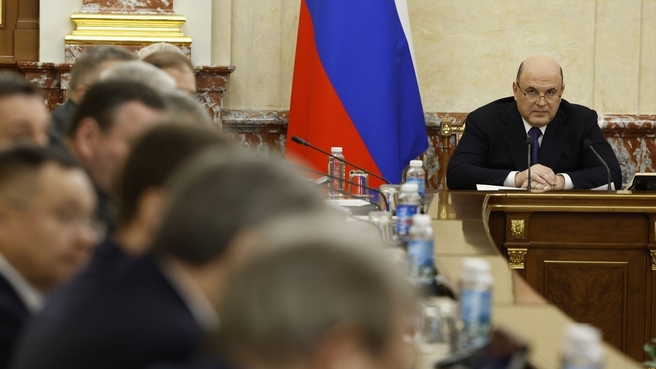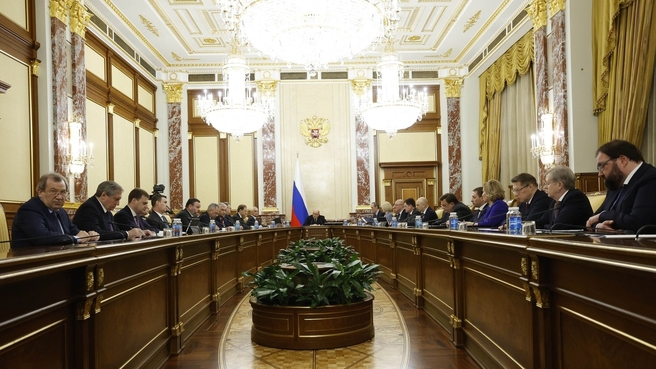Agenda: expanding low-interest mortgage programmes, improving the social security of service personnel, financing the construction of a seaport terminal in Chukotka, and expanding LNG exports.
Mikhail Mishustin’s opening remarks:
Colleagues,
The President has said that improving people’s living conditions is one of our unconditional priorities, and the development of the mortgages market, including state-supported programmes, has a special role to play here.
The Government is improving regulations for issuing these low-interest loans, so that more Russian citizens would be able to resolve the housing issue.
First of all, we are expanding family mortgages. Parents raising children with disabilities will be able to take out these mortgages to purchase ready-made housing on the secondary market if their respective regions are not building any new blocks of flats.
From now on, it will be possible to use low-interest, family, Far Eastern and IT mortgages to purchase ready-made housing from closed-end unit investment funds. This will create additional opportunities for people and developers.
We
have adopted another innovation for service personnel involved in the special
military operation and mobilized people.
These young people are now serving in the Armed Forces, and it is important to
rid them of the need to engage in formalities and cut red tape. Consequently,
those who have taken out loans under the Low-Interest Mortgages programme for
building or purchasing a private home will be eligible for a deferment and can register
the property rights at a later date. Interest rates will be retained and, what
is also important, they will be able to register at the address of their
properties, purchased or built using the Far Eastern mortgage programme’s
assets, at a later date than required by standard terms.
The Government also continues to improve the social protection system for those who are fulfilling their military duty, their relatives and loved ones. The President has repeatedly stressed the importance of supporting service personnel, law enforcement officers and members of their families.
The President gave instructions to draft a bill that would give them the right to use the service housing they occupy, to receive monetary compensation for its rent, and to keep their place on the waiting list to improve their living conditions. This rule will apply to military personnel whose families are unable to travel to their place of duty.
These are areas where, for objective reasons, it is difficult or impossible to provide conditions for relatives to stay. The Government of the Russian Federation will draw up a list of such areas.
We hope that these measures will improve the social guarantees for our defenders and their families.
Now on to another topic. The integrated development of the Northern Sea Route’s port infrastructure is ongoing in line with the President’s instructions. This major international transport corridor runs entirely within Russia’s territorial sea and exclusive economic zone. The traffic flow through this corridor is growing steadily, and it meets the needs of millions of people living in the Arctic zone and the Far East, as well as provides reliable logistics for raw materials and industrial products. We discussed these issues in detail when we visited Chukotka, Kamchatka, Magadan and neighbouring areas.
The President emphasised the need to make sure that every port on the route provides ship servicing and cargo handling.
In the next four years, we will spend over 27.5 billion roubles on building a new seaport terminal in Pevek, Chukotka. The terminal will have freight piers, hydro-technical facilities, including a harbourage, an access canal, a dam, as well as essential navigation equipment.
This infrastructure will make it possible to deploy additional floating nuclear power units. This will allow for expanding production at the unique Baimskaya copper-porphyry deposit, so that it would reach its design capacity. We talked about it multiple times when we visited this region. It will become possible to ship out up to two million tonnes of metal ore produced there once the terminal is ready.
As a result, new jobs will be created, as well as modern transport infrastructure, and the Northern Sea Route’s capacity will also continue to increase.
Today, we will also review a bill that will help utilise the capacities of Arctic routes for delivering liquefied natural gas to the east, specifically, to countries of the Asia-Pacific region. The President has set forth tasks for expanding LNG production and shipments, including to foreign markets.
The Government suggests expanding the geography of gas deposits whence the export of LNG is allowed, adding to the list promising deposits located far away from the Unified Gas Supply System. It appears economically inexpedient to build trunk pipelines to these remote areas. Above all, this refers to northern areas in the Krasnoyarsk Territory and the Yamal-Nenets Autonomous Area, where huge amounts of natural gas (about three trillion cubic metres) are located.
This decision will make it possible to expand annual LNG production volumes to 100 million tonnes in the next seven years, to boost LNG exports and to consolidate the Russian Federation’s position on the market of this environmentally safe fuel.














